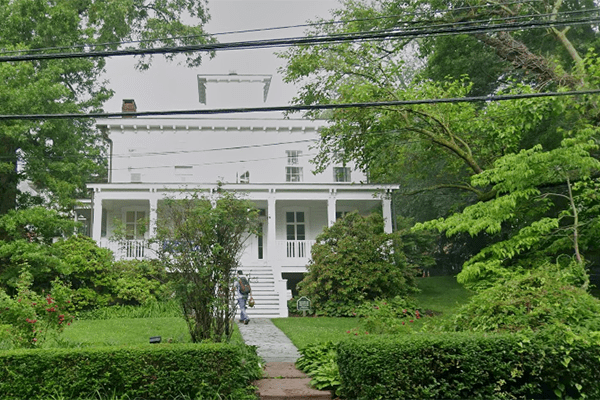|
RCBJ-Audible (Listen For Free)
|
Historic Italianate Draws Time & Resources From Nyack Library’s Budget and Mission
By Tina Traster
When Nyack Library doubled the size of its facility for its 2011 expansion project, it bought a swath of land behind its building for parking – and by default a house, because it sat on the same lot. But this wasn’t any house – the Tunis DePew Italianate at 50 Piermont Avenue built in 1852 is one of the village’s most gracious and recognizable edifices.
Now, two decades later, Nyack Library is hoping to sell the house because it is cumbersome and expensive to maintain, and the management of the real estate asset detracts from the library’s main mission. Additionally, the sale of the house would offset anticipated costs associated with refinancing the library’s debt when its bond comes due in 2027.
Because some library trustees are hesitant about the sale, and because members of the public have expressed concern about the library turning the house over to the free market, the board has planned a public meeting on Thursday at 7 in the community meeting room to field questions and concerns.
“After a year of thinking about this, I am interested in selling,” said Nyack Library Board President Steven Cea. “But first I’m open to listening to public comment.”
For years, leasing space in the Depew house has allowed the library to break even on the asset. However, rising maintenance costs and lack of a basement tenant, have raised questions about whether the house is an asset or a financial burden moving forward.
The library purchased the house in 2004 from Mark Innerst for $1.3 million, according to county records. The $8.6 million library expansion, which began in 2008, required adjacent land for parking. Over the years, the house has been rented by the Historical Society of the Nyacks, which uses space for both exhibitions and storage. Professional therapists occupy six spaces on the upper floor. Cea said the board began discussing the economics of the house in 2022 when patrons raised questions about rising taxes and the costs associated with upkeep on the house. In 2023, the library established an ad hoc committee to study the DePew house, and alternatives for its future.
Dominic Pilla of DRPilla, Consulting Engineers, which conducted the “Existing Condition & Feasibility Study on the Depew House,” found the building, “envelope” is in fair to poor condition throughout, and found deficiencies in the siding, windows, rear porch, the porch deck, and exposed rubble foundation. The roof and chimney are in fair condition.
“We see a consistent $10,000 to $15,000 loss annually on the house since 2021,” said Cea. “We haven’t done a 2025 audit yet, but the figures show a consistent loss.”
The house costs the library more than maintenance, Cea said, explaining portions of salaries for the library’s director, business manager and maintenance staff, cover time spent managing the structure and leases.
“We are trying to answer questions about the time and energy the house takes away from the staff and the library’s core mission,” Cea added.
The Depew House, located on .34 acres at the corner of Piermont and Hudson Avenues, was built between was built in 1854 as the home for the most prominent Nyack family, the Depews, who lived there until 1916. The Italianate mansion has a gracious wraparound veranda, a bracketed cornice and a picturesque belvedere. The covered front porch overlooked greenhouses that the Depew family operated in what is now Memorial Park. However, the house is not listed on either the state or national register of “Historic Places,” and therefore has no official protection.
Board members are sensitive to finding a way to protect the building, even if they sell it, potentially through a deed restriction or a restrictive covenant. They estimate the building could sell for between $900,000 and $1.3 million, but they have not done an appraisal.
“We’re all stewards of our community for a short time,” said Cea. “I live here. I want to make sure history in preserved.”
He pointed out that many of Nyack’s grandest buildings are in private hands and are a “pleasure to look it.” He said the board is looking at ways to protect the house from being torn down if it’s sold. He said selling it may be an opportunity for the house to be upgraded because a buyer might have deeper pockets than the library.
Win Perry, an architect, historian, and former president of the Historical Society of the Nyacks, said he believes the library should hold onto the building. The Historical Society of the Nyacks occupies three quarters of the main floor for a small museum and uses the space for its archives.
“A purchaser could demolish the building and put up something more profitable,” he said. “The building is a beautiful and significant part of the village. It helps people understand history. I believe it’s worth being held by a public entity.”
For now, the Historical Society is paying rent on a month-to-month basis.
“A sale,” said Lee Hoffman, a Society board trustee, “would be a big loss.” Hoffman said some of the vacant retail stores in Nyack might be a replacement for temporary exhibits, but it would be more challenging to find space for the organization’s archival materials.
But the library board has math to calculate, too.
On its most recent financial report for June 2025, the Nyack Library had available cash of $233,000 and $2.4 million invested in short-term Certificates of Deposit. The library carries long-term debt of just over $6 million dollars from its 2017 tax-exempt bond financing. Debt service is about $36,000 per month, and the bond is subject to call in October 2027 when the principal of $5.455 million will need to be paid or refinanced.
Cea, worried about high interest rates, said the sale of the building would help the library set up a debt reduction reserve that would either generate interest income or be used to pay off principal on the bond.
“If we can reduce our debt payments, that will free up money in the budget to do a number of things including increasing programming, offer more competitive salaries, reduce taxes,” said Cea.
The Nyack Library celebrated the grand opening of its $8.6 million expansion, a steel and glass annex designed by Barbara Corwin, on May 7, 2011. This expansion nearly doubled the size of the library and modernized its facilities. The new wing added more computers with Internet access, enhanced public meeting spaces, and new areas for different age groups.
The “Existing Condition & Feasibility Study” says, “In the event that the existing building were to be listed for commercial sale, there would be no specific upgrades required for the building to function as a standalone commercial building.” The house does not have a kitchen.
Cea said the property had been generating around $86,000 a year in rent.
The report also notes that when the library bought the property, a shared use parking easement was created, reserving six parking spaces in the Nyack Library lot for the Depew House’s use. If the library sought to reclaim those parking spaces in a sale, the report says, the Village code would mandate additional parking be created for the Depew House, requiring both planning board approval and a zoning variance because there is not sufficient room to construct parking elsewhere for the Depew House.
However, maintaining the easement (allowing continued use of the parking for the Depew House) would permit the sale of the property and its continued use as a commercial building as-of- right with no modifications needed.
If the house is sold for use as a single-family residence, two of the parking spaces reserved for the Depew House would have be maintained, with the library able to reclaim the other four.
It remains unclear if any state agency approval will be necessary. Sale of the Depew House may require approval from the New York State Board of Regents in accordance with the New York State Education Law. Approval is necessary when a state chartered library or educational institution sells real property. The approval process ensures that transactions are arms-length, and that the property trades for its fair market value. Generally, an independent appraisal must be submitted along with a petition approving the sale. Complicating the matter is that the Depew House never functioned as a library, it was essentially an investment property owned by the Nyack Library, so the level of state scrutiny may be minimal.















